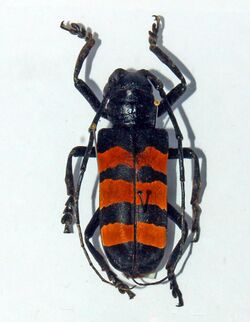Biology:Analeptes trifasciata
| Analeptes trifasciata | |
|---|---|

| |
| Analeptes trifasciata | |
| Scientific classification | |
| Kingdom: | |
| Phylum: | |
| Class: | |
| Order: | |
| Family: | |
| Subfamily: | |
| Genus: | |
| Species: | A. trifasciata
|
| Binomial name | |
| Analeptes trifasciata (Fabricius, 1775)
| |
| Synonyms | |
| |
Analeptes trifasciata is a species of flat-faced longhorn beetle in the subfamily Lamiinae of the family Cerambycidae.
Description
Analeptes trifasciata reaches about 5–6 centimetres (2.0–2.4 in) in length. The female is slightly larger than the male. The basic colour of the body is black, with three reddish-orange bands across the elytra (hence the Latin species name trifasciata). The black antennae are kept flat along the back and extend beyond the abdomen.
Adults and larvae of Analeptes trifasciata feed on the bark and underlying wood of Adansonia digitata, Anacardium occidentale, Annona senegalensis, Ceiba pentandra, Eucalyptus camaldulensis, Eucalyptus globulus, Eucalyptus saligna, Sclerocarya birrea, Spondias mombin, Sterculia setigera, Sterculia tragacantha.[1] Infestation of this insect may have devastating effects on cashew (Anacardium occidentale), with relevant economic damages.
Distribution
This species can be found in Central Africa (Angola, Benin, Cameroon, Central African Republic, Democratic Republic of the Congo, Ethiopia, Ghana, Ivory Coast, Kenya, Liberia, Niger, Nigeria, Senegal, Sierra Leone and Togo).[1]
Habitat
Analeptes trifasciata is typically an inhabitant of savannah, but it is also present in forests edges with plants of family Anacardiaceae.
References
- Michael R. Wagner, Stephen K. N. Atuahene, Joseph R. Cobbinah - Forest entomology in West Tropical Africa: forest insects of Ghana – Nature, 1991
External links
Wikidata ☰ Q4751021 entry

